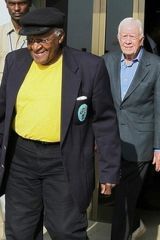International elders call for rapid deployment of Darfur force
October 4, 2007 (KHARTOUM) — A group of elder statesmen led by South African Nobel peace laureate Desmond Tutu, on a mission to foster peace in Sudan, called on Thursday for the rapid deployment of a joint UN-African Union peacekeeping force in Darfur.
 “It’s quite clear to us that the crucial element to end the suffering of the people of Darfur is for the hybrid force to be deployed as soon as possible,” Tutu told reporters in Khartoum.
“It’s quite clear to us that the crucial element to end the suffering of the people of Darfur is for the hybrid force to be deployed as soon as possible,” Tutu told reporters in Khartoum.
His comments followed an attack on African Union peacekeepers in Darfur last Saturday that left 10 African troops dead, the bloodiest yet on the struggling AU force.
The mission is the first for “The Elders”, a group launched by fellow Nobel laureate and former South African president Nelson Mandela and includes former UN envoy Lakhdar Brahimi, ex-US president Jimmy Carter, and Mandela’s wife, Graca Machel.
They went to experience first hand the suffering of the people of Darfur and find ways to end violence in a region plagued by four years of civil war that has left an estimated 200,000 people dead.
But the deployment of a 26,000-strong UN-AU force to replace the current 7,000 under-equipped AU troops may yet prove inadequate if progress is not made on other peace deals in the country, the group warned.
“This critical stage of the peace in Darfur depends on the CPA,” Tutu said, referring to the Comprehensive Peace Agreement signed in 2005 between Khartoum and southern rebels to end a decades-long civil war.
Carter spoke of the “strong differences in opinion” between the north and south governments over the application of the deal on issues like border demarcation and elections scheduled for 2009.
The former president insisted there could be no lasting peace in Sudan if these questions were left unresolved.
He said the problems in Darfur need a political solution and called on participants at crucial peace talks in Libya on October 27 to be patient.
Brahimi also urged a comprehensive peace in Sudan, Africa’s largest country.
“We cannot solve Darfur if the CPA is crumbling,” he said, reiterating the call for a speedy deployment of the UN-AU force.
In Addis Ababa, Ethiopian Prime Minister Meles Zenawi pledged to send 5,000 troops to join the new force, many of them battle-hardened after helping neighbouring Somalia’s transitional government oust Islamist militias.
During their visit, which kicked off on Sunday, the elders met twice with Sudanese President Omar al-Beshir and held talks with members of the semi-autonomous government in Juba, capital of south Sudan.
The group also travelled to different parts of Darfur, where Saturday’s attack on an African Union base by a group of heavily armed men killed 10 African peacekeepers and drew worldwide condemnation.
The AU said that one man was still missing after the attack, but declined to elaborate on his identity.
The UN Security Council in a statement Tuesday deplored the fact the attack took place so soon before the Tripoli talks which aim to broaden a Darfur peace agreement signed by only one rebel faction in May last year, saying “any attempt to undermine the peace process is unacceptable.”
The bodies of seven Nigerian soldiers killed in the attack were flown home on Thursday for a state burial, and the bodies of the other three victims, from Botswana, Mali and Senegal, were also to be flown to their countries.
The United States, which accuses Khartoum of genocide over the Darfur conflict, has warned both the Sudanese government and rebel groups of new sanctions if they continue to flout a ceasefire.
US lawmakers are also seeking to pass a bill requiring US investors to pull out of foreign companies seen as propping up the Khartoum regime.
Conflict in Darfur, combined with the effects of famine, has left at least 200,000 people dead and two million displaced since Khartoum enlisted Janjaweed Arab militia allies to put down an ethnic minority revolt in 2003.
Sudanese authorities say only 9,000 people have died.
(AFP)
